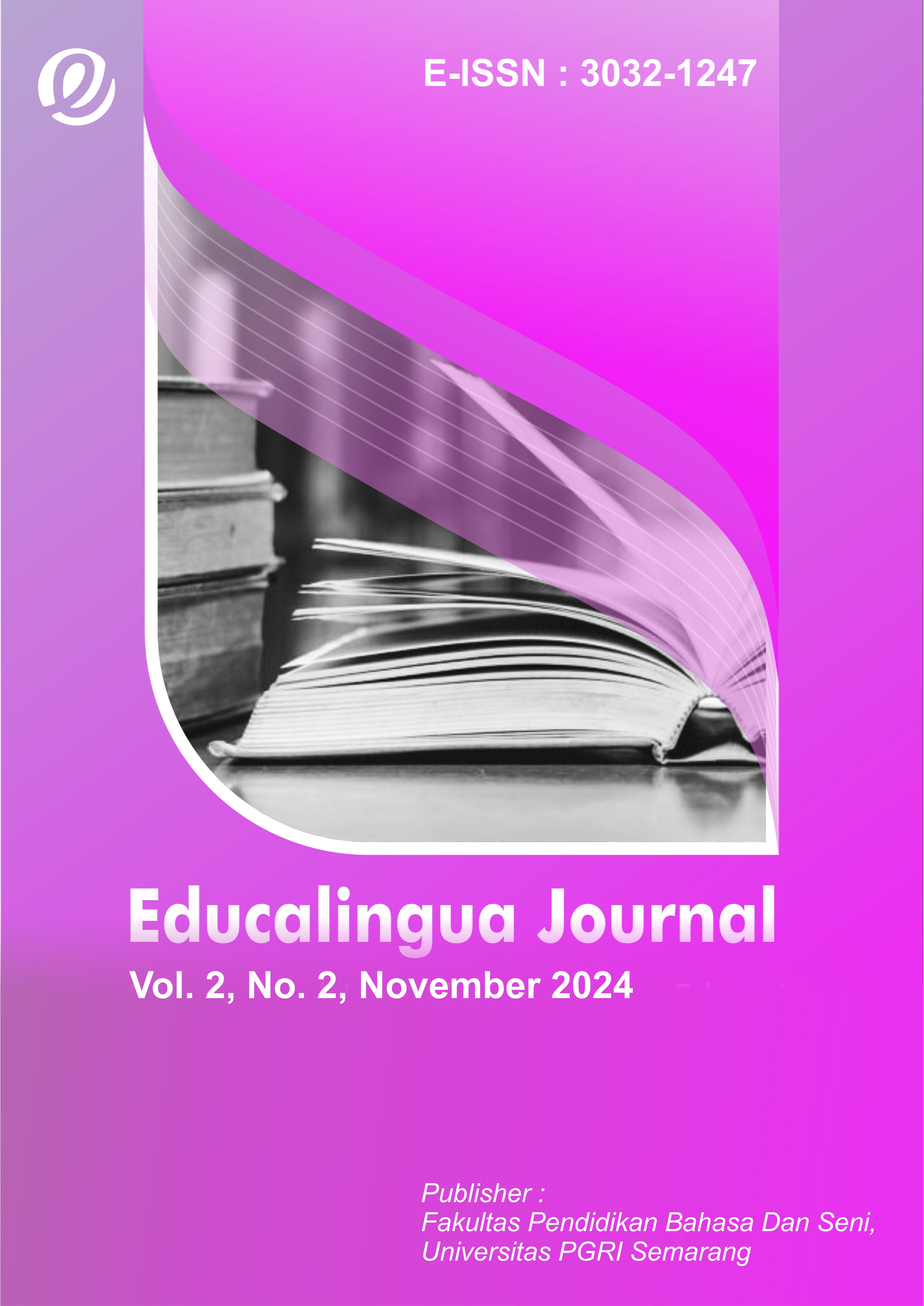Formative Assessment Implementation: Does it Enhance EFL Students’ Learning Motivation?
DOI:
https://doi.org/10.26877/educalingua.v2i2.848Keywords:
English teaching, Formative assessment, Student motivationAbstract
This study aims to determine the implementation of formative assessment in English teaching to enhance student motivation. The research design of this study is a qualitative descriptive research design. The subjects in this research were 30 class X students at SMA Indonesia Semarang. The instruments used in this research were observation, interviews, and open and closed questionnaires adopted and adapted from Theodoridis & Kraemer (2020). The collected data was then analyzed using descriptive qualitative and closed questionnaires using SPSS 21. The research showed that before implementing formative assessments such as quizzes, discussions, and Google forms in learning English, students experienced various obstacles, including lack of vocabulary, understanding, self-confidence, etc. However, everything changes when this type of assessment is implemented where students show significant results as seen from students being able to understand the learning, increasing students' vocabulary in speaking English, making learning more interesting and not boring. From the above, it can be said that students are very motivated which shows a result of 82.1% in this research.
References
Amaliah, S., Education, F. O. F., & Training, T. (2022). Implementation of formative assessment by english teachers during covid-19 pandemic : a case study at smk negeri 1 tambusai implementation of formative assessment by english teachers during covid-19 pandemic : a case study at smk negeri 1 tambusai.
Basuki, Y., & Hidayati, Y. (2019). Kahoot! or quizizz: the students’ perspectives. https://doi.org/10.4108/eai.27-4-2019.2285331
Borah, M. (2021). Journal of critical reviews motivation in learning. Journal of Critical Review, 8(02), 550–552.
Carrasco, D., Banerjee, R., Treviño, E., & Villalobos, C. (2020). Civic knowledge and open classroom discussion: explaining tolerance of corruption among 8th-grade students in Latin America. Educational Psychology, 40(2), 186–206. https://doi.org/10.1080/01443410.2019.1699907
Ekua, A. T., & Sekyi. (2016). Assessment, student learning and classroom practice: a review. Journal of Education and Practice, 7(21), 1–6. http://search.ebscohost.com/login.aspx?direct=true&db=eric&AN=EJ1109385&site=ehost-live
Evans, D. J. R., Zeun, P., & Stanier, R. A. (2014). Motivating student learning using a formative assessment journey. Journal of Anatomy, 224(3), 296–303. https://doi.org/10.1111/joa.12117
Ferdinal, & Isramirawati. (2021). The impact of formative assessment on students’ academic achievement. Proceedings of the 3rd International Conference on Educational Development and Quality Assurance (ICED-QA 2020), 506(1), 142–161. https://doi.org/10.2991/assehr.k.210202.024
Holly, C. (2018). Qualitative descriptive research. Scholarly Inquiry and the DNP Capstone, 4, 255–256. https://doi.org/10.1891/9780826193889.0005
Khoerul ummah. (2022). Penggunaan media google form dalam pembelajaran bahasa indonesia siswa kelas vii smpn 8 kota tangerang tahun pelajaran 2020/2021. 8.5.2017, 2003–2005.
Leenknecht, M., Wijnia, L., Köhlen, M., Fryer, L., Rikers, R., & Loyens, S. (2021). Formative assessment as practice: the role of students’ motivation. Assessment and Evaluation in Higher Education, 46(2), 236–255. https://doi.org/10.1080/02602938.2020.1765228
Morris, R., Perry, T., & Wardle, L. (2021). Formative assessment and feedback for learning in higher education: A systematic review. Review of Education, 9(3), 1–26. https://doi.org/10.1002/rev3.3292
Mr.SAOUD Ammar. (2016). Impact of formative assessment on raising students ’ motivation : case of third year efl students at the university of el-oued.
Muho, A., & Taraj, G. (2022). Impact of formative assessment practices on student motivation for learning the english language. International Journal of Education and Practice, 10(1), 25–41. https://doi.org/10.18488/61.v10i1.2842
Poliarush, N. (2021). Impact of formative assessment on students ’ motivation Natalia Dmitrenko Vinnytsia Mykhailo Kotsiubynskyi State Pedagogical University , Ukraine Introduction Learning habits of students are explained by a complex of motives . Multiple. 8(2), 36–50.
Prastikawati, E. F., Wiyaka, W., & Adi, A. P. K. (2020). Online backchannel as a formative assessment in improving writing skills. Journal on English as a Foreign Language, 10(2), 359–384. https://doi.org/10.23971/jefl.v10i2.2044
Sakkir, G., Rukmana, N. S., Muslim, A. B., Andrew, M., & Muhayyang, M. (2023). The challenges faced by students in learning english (post-pandemic era). Interference: Journal of Language, Literature, and Linguistics, 4(1), 111. https://doi.org/10.26858/interference.v4i1.43966
Sanchez-Lopez, E., Kasongo, J., Gonzalez-Sanchez, A. F., & Mostrady, A. (2023). Implementation of formative assessment in engineering education. Acta Pedagogia Asiana, 2(1), 43–53. https://doi.org/10.53623/apga.v2i1.154
Syamsuddin, R. (2021). Learning motivation motivation of learning. Learning motivation, july. https://www.researchgate.net/publication/353437453%0ALEARNING
Theodoridis, T., & Kraemer, J. (2020). An analysis of students’ motivation in learning english at junior high school 2 bangkinang kota by.
Ugwuanyi, C. S., Okeke, C. I. O., & Mokhele-Makgalwa, M. L. (2021). University academics’ perceptions regarding the use of information technology tools for effective formative assessment: implications for quality assessment through professional development. International Journal of Higher Education, 11(1), 1. https://doi.org/10.5430/ijhe.v11n1p1








